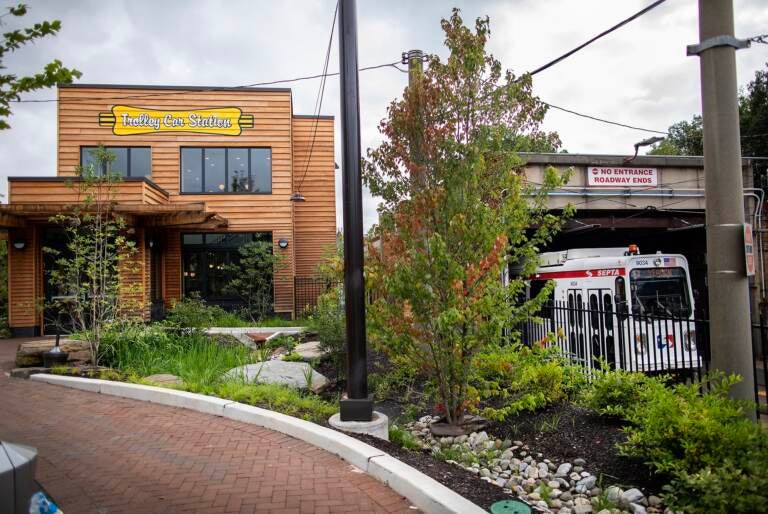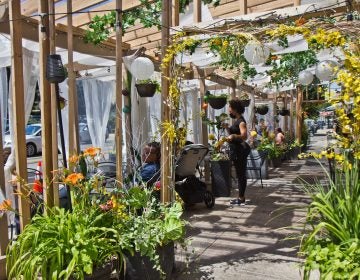How Philly transformed a trolley station into a garden
40th Street’s Trolley Portal Gardens is a perfect example of how greening transit spaces in Philadelphia is good for the economy, communities, and our city.

40th Street’s Trolley Portal Gardens took eight years to complete through public-private partnership with various organizations, including SEPTA and the City of Philadelphia, and neighborhood groups and lots of fundraising. (Courtesy of The Sustainable Business Network of Greater Philadelphia)
Transit hubs are more than just places to wait for the train, bus, or trolley — they are opportunities.
In the Greater Philadelphia region, millions of SEPTA riders travel through these spaces each day, moving through them as they go to work, school and wherever else they need to go.
More often than not, they are paved, barren landscapes that contribute to urban heat island effect and stormwater runoff while offering minimal safety and comfort to riders. Yet there are ways to mitigate this unfortunate reality. Right here in West Philadelphia, a model of successful green stormwater infrastructure can be found at 40th Street’s Trolley Portal Gardens.
The bustling transit artery is one of the busiest hubs in the city, connecting 60,000 commuters each day to Center City, West Philadelphia, neighborhoods such as Eastwick and Angora, and to the Delaware County suburbs of Yeadon and Darby. For years, the drab stretches of brick and concrete marked by a maze of trolley tracks and zig-zagged overhead wires served as a dull, lifeless expanse that contributed to severe drainage problems and led to flooding and other issues. The project started in 2010, when the Spruce Hill Community Association approached University City District to transform the area surrounding the 40th Street trolley station into an attractive space for riders, pedestrians, and residents. Through a public-private partnership, SEPTA, the City of Philadelphia, University City District, and neighborhood stakeholders raised $2.1 million in state and capital grants and numerous generous community donations to renovate the portal into an innovative, green hub.
Guided by a community engagement process, the design team — including Meliora Design, Andropogon, Group G Architects, and others — took direction and feedback from the people who use the space. By combining urban design, infrastructure renewal, and community engagement, the trolley portal was transformed from an unsightly expanse of concrete into a vibrant social hub that today features beautiful landscaping, movable seating, and a restaurant – Renata’s Kitchen – that serves as a community asset to scores of neighbors, commuters, and local employees. Today, the site is maintained weekly by Green City Works, a division of University City District, a full-service landscaping social venture that employs residents who went through the West Philadelphia Skills Initiative program with a starting salary of $15 plus comprehensive benefits.
How to fund a transit garden
Exemplary in its size and scale, 40th Street’s Trolley Portal Gardens shouldn’t be a unique project.
Instead, let it be a replicable model and inspiration for the future of all Pennsylvania transit hubs. Our government leaders can help make this happen by ensuring substantive funding and investment for GSI at the state level by restoring funding to Pennsylvania’s Act 167. The Act was defunded by the General Assembly in 2005, limiting the ability of municipalities to implement or even encourage GSI through direct investments or local ordinances and regulations. That, in turn, prevented many municipalities in the Commonwealth from taking full advantage of 2009’s American Recovery and Reinvestment Act. Creative financing models like the Clean Water State Revolving Fund, a federal-state partnership that provides communities low-cost financing for water quality infrastructure projects, can also offer substantive support for investment in GSI. Funding for alternative transportation infrastructure can expand projects like the Trolley Portal Gardens throughout municipalities in the Commonwealth and further maximize the return on investment.
Local and state funding is already available, including through the Philadelphia Water Department’s stormwater grant programs. And, with President Biden’s proposed multi-trillion infrastructure package, Philadelphia and the Commonwealth would have the opportunity to add new federal investments in alternative transportation infrastructure and green stormwater infrastructure to redevelop our transit hubs into the community centers they are waiting to be.
Projects such as the Trolley Portal Gardens offer strong community-based examples of what it can look like when we build an economy with local businesses, equity, and climate resilience at the forefront. The project succeeds on multiple levels, including improved pedestrian and rider safety, improved environmental health, contracts and customers for local businesses, and the creation of family-supporting green jobs.
Wouldn’t it be great if all of our transit hubs fostered social, environmental, and economic benefits for all?
*The Trolley Portal Gardens is the recipient of the Public Project award at SBN’s 2021 Excellence in GSI Awards Ceremony. Congratulations to the planning and design team, including Meliora Design, Andropogon Associates, Tillet Lighting Design, Mulhern Consulting Engineers, and Group G Architects.
Anna Shipp is the executive director for the Sustainable Business Network of Greater Philadelphia.

Subscribe to PlanPhilly
WHYY is your source for fact-based, in-depth journalism and information. As a nonprofit organization, we rely on financial support from readers like you. Please give today.







